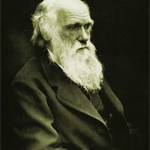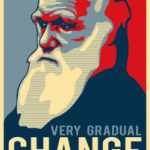darwin
Sunrise on the Maasai Mara, Kenya. Vearl Brown / Creative Commons
From the beginning our human family has been on a journey. Born together, in eastern Africa about 100,000 years ago, our ancestors migrated to distant points around the globe. Our family scattered, communication was cut off and, in most cases, we forgot about them all together. We went our separate ways and lived our separate lives. Like siblings each adopted by different parents in distant lands, we came to identify with where we were raised instead of where we were from. Now, after accumulating so many years of…
What Darwin said - and was he right?:
In this Darwin year many popular accounts of 'Darwinism' have appeared, but these seldom make a clear distinction among the different components of Darwin's theory of evolution. Many popularisations are simplified to the point of caricature, and presented in an absurdly uncritical way. I yield to few in my admiration for Darwin, but I do not think his memory is best served by oversimplifying his ideas or pretending that he was always right.
So I will attempt to identify the key propositions of 'Darwinism', with an assessment of their current standing.…
Again, the press are talking about "the missing link". Let's get one thing clear. There is no missing link. Rather, there are an indefinite number of missing branches. To have a missing link, you need to visualise evolution as a chain. If there's a gap in the chain, then you have a missing link. But evolution, at least at the scale of animals and plants, is mostly a tree. And all we see are individual nodes of the tree, the extant species that form, in Darwin's metaphor, the leaves of the living tree, and the extinct species that form branching points deeper in the tree. But we do not have…
Pt. I | Pt. 2 | Pt. 3
---
Part 3 with Martha McCaughey, discussing her book The Caveman Mystique, follows below. All entries in the author-meets-blogger series can be found here.
WF: So how is the use of evolutionary psychology to explain masculine actions not just quackery? Evolutionary biologists, and many who read science blogs, rightly announce and discredit the quackery of creationists or, more broadly, those who "deny" scientific truths. But, for the sake of argumentative symmetry, can one put that lens back onto evolutionary psychology? Besides the caveman issue, does that field…
Pt. I | Pt. 2 | Pt. 3
---
Part 2 with Martha McCaughey, discussing her book The Caveman Mystique, follows below. All entries in the author-meets-blogger series can be found here.
WF: How do you see the relationship between the academic fields of gender studies and science studies? And how has that relationship changed in the past two decades? I'm asking for a few reasons, but one of them is that I remember from graduate studies that many of the most persuasive accounts of the politics of science and technology came from feminist scholars.
MM: It's a big question, so I'll offer but a start…
tags: The Beagle Project, science, fund-raising, humor, streaming video
This strange and amusing streaming video features a self-described "fat, bearded chap with a Charles Darwin fixation" whom I know in real life, has an important purpose: Let's knock ourselves out to rebuild the HMS Beagle and use this vessel to follow Darwin's journey of discovery! [1:14]
The Beagle Project aims to celebrate Charles Darwin's 200th birthday by building a sailing replica of the HMS Beagle and recreating the Voyage of the Beagle with an international crew of researchers, aspiring scientists and science…
One of the things I don't like about the Darwin Awards is that it presumes the only way to gain one is to remove yourself from the gene pool directly by dying. But that would be a Wallace Award. Darwin knew, as do we, that there are many ways one can avoid contributing to the future gene pool, and it doesn't need to involve not having children. Being totally unfit to walk around without a leash is another, if it's heritable. Down the track, the "stupid gene" will get eliminated too, eventually.
So it's nice to see Michelle Bachmann get a prehumous, not a posthumous Darwin Award.
Yes, I know there are thousands of these this year, and by October we'll all be tired of them, but this one looks like the main game: Darwin/Chicago 2009. I am, of course, upset not to be invited to speak, but there are a few good names there to make up for my absence...
This post was written by guest contributor Jody Roberts.
Follow this link for his most recent contribution to The World's Fair.
The philosopher Marjorie Grene passed away on Monday, 16 March, at the age of 98. Grene's life is difficult to sum up in a few words, and I don't want to do that anyhow, since plenty of others have and surely will in much better fashion than I can muster. But since I imagine most will be unfamiliar with her work, I quote here from a letter composed by Richard Burian, a dear friend and colleague:
Marjorie Grene passed away March 16 at age 98 after a brief illness…
There are several misconceptions circulating about Charles Darwin and his revolutionary ideas and theories in the field of evolution. That's why, in honor of Darwin's birthday last month, ScienceBlogger John Wilkins from Evolving Thoughts took it upon himself to clear things up. In his eight-part series, "Myths about Darwin," Wilkins addresses and debunks claims such as those that paint Darwin as a social Darwinist or Lamarckian and sets the record straight.
Related ScienceBlogs Posts:
Myth 1: Darwin Did Not Believe in the Reality of Species
Evolving ThoughtsFebruary 10, 2009
Myth 2: Darwin…
About two weeks ago I went to Politics and Prose for a great talk by the New Yorker's Adam Gopnik, who was in DC promoting his new book, Angels and Ages, a book of essays about Charles Darwin and Abraham Lincoln. The words and actions of these two influential men - some would call them secular saints - still reverberate today. And coincidentally, they were also born just hours apart, on the same day: February 12, 1809.
Gopnik explicitly said that he did not intend to suss out any mystical or astrological significance to the shared birthday: it's a coincidence, and nothing more. But as he…
A talk Michael Ruse gave recently in Sydney for the celebrations of Darwin's 200th birthday is now available as a podcast from the ABC (Australian Broadcasting Corporation) here. Or here:
There's been a highly publicised conference at the Vatican about evolution. There are good and sensible things being said there, and silly ones.
The good and sensible things are that nobody questions that evolution occurs, and it is asserted that faith and science cannot conflict (which means, therefore, that faith will have to adapt to science, since science changes only in response to the evidence).
The less sensible things are that evolution is not the cause of atheism, and that those, specifically mentioning Dawkins, who claim that it does are being "scientistic", that is, practising…
Darwin's Dangerous Idea, according to Daniel Dennett in the book by that name, is natural selection. This is often referred to as "Darwin's theory". But Darwin did not always think evolutionary events or processes were due to natural selection.
First off, let's say this again: Darwin did not think that evolution was due to chance. His mechanism of evolution was not "random chance", as Behe and others have asserted. He believed that variation was not correlated with fitness, yes, and occurred in ways that are statistically distributed (a conception not available until Galton came up with the…
Actually, this one is better called "Darwin was a racist", but as the text concerned is from the same source as those claims, I thought it might be easier to evaluate a single claim and generalise from that.
Our gospel for today is chapters V and VI of The Descent of Man, published in 1871.
If you read Darwin sloppily, or to find evidence that he really was a Very Bad Man for rhetorical - usually religious - purposes, you soon come across this statement. In fact, you can find paraphrases of it in literally hundreds of creationist documents and sites. Here is the offending passage, from…
image by Mike Rosulek
buy merchandise here to benefit NCSE
It's a classic question: if Charles Darwin had known about Gregor Mendel's genetic research, would Darwin have realized it was the missing piece he needed to explain how individual variation was inherited and selected? Was it simply bad luck that Darwin never stumbled on the right experiments? Or was Darwin so constrained by his own perspective on inheritance that he couldn't have seen the importance of Mendel's work, even if he had known about it?
Jonathan Howard has written an intriguing overview of this question. He argues that…
Perhaps we are all subject to falling into the trap of what I call the Hydraulic Theory of Everything. If you eat more you will be bigger, if you eat less you will be smaller. Emotional states are the continuously varying outcome of different levels of a set of hormones, forming "happy" or "stressy" or "angry" cocktails. Your brain is a vessel into which life pours various elixirs. Too much of one thing, and there will not be enough room for something else. Even political arguments are hydraulic. The 'balanced' middle view between two arguments is like the mixture of contrasting primary…
Writing at Christian Today Tony Campolo has unleashed a stunningly stupid barrage of attacks against Charles Darwin.
Campolo is a bit of a celebrity among the evangelical left. He can thump his Bible with the best of them, but also defends progressive political positions. That he is usually a rare voice of political moderation in an ocean of evangelical narrow-mindedness makes this essay especially disappointing. We consider his essay in full.
Campolo begins:
Many supporters of the principle of separation of church and state say that the Intelligent Design Theory of creation ought not…
This myth says a lot about the default views of western thinking, rather like the issue of teleology.
One of the constant and incessant complaints made against Darwin by theists in particular, is that he introduced chance and purposelessness into our worldview. I don't believe in such entities as worldviews, but leave that for now: did he introduce chance, and if so, does it imply a general lack of purpose in the world?
Here are some classic examples of that complaint. From Is Darwin Right? Or, The Origin of Man in 1877, William Denton wrote:
... it has been said that those who advocate…


